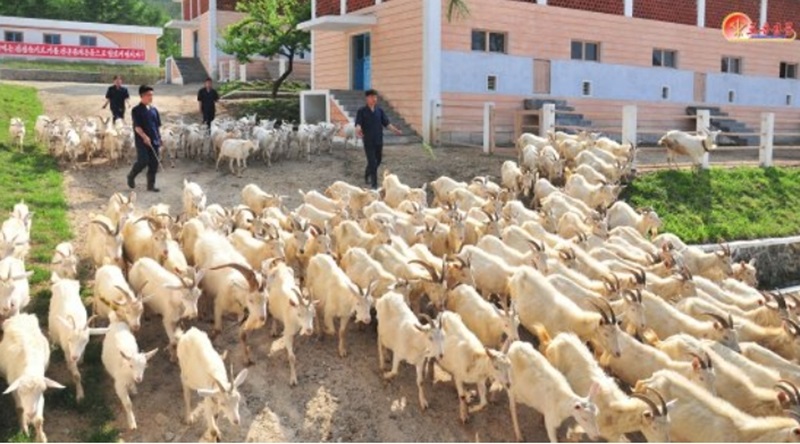A recent shipment of 447 Russian goats to North Korea is marking the beginning of a long-term exchange between the two countries.
Oleg Malashchenko, Deputy Chairman of the Agricultural and Industrial Complex Committee in Russia’s Leningrad region, told the Russian daily Vedomosti that the country plans to deliver around 1,000 goats annually to North Korea under a three-year contract, Radio Free Asia reported on August 29.
According to Malashchenko, North Korean representatives have previously expressed interest in purchasing larger quantities of goats and securing long-term contracts with Russia.

On August 2, North Korea’s Workers’ Party newspaper, Rodong Sinmun, urged the need to properly establish livestock bases and significantly expand goat farming. [Screenshot]
Mark Boychuk, Manager of Agriculture and Consumer Sectors at the Russian consulting firm Strategy Partners, mentioned in Vedomosti that Russia’s past goat exports were sporadic and primarily sent to Central Asian countries. He emphasized that the collaboration with North Korea on goat exports could be a “significant breakthrough” for Russia.
Boychuk also noted that if this contract proceeds smoothly, it could open opportunities to expand the supply of other types of agricultural products to North Korea.
As Russia secures a stable market for livestock exports and North Korea works towards self-sufficiency through agricultural cooperation, the interdependence between the two nations is deepening.
William Brown, a North Korean economic expert and professor at the University of Maryland, told Radio Free Asia (RFA) on August 29 that North Korea is likely to pursue more diverse and deeper exchanges with Russia as a result of this long-term agreement.
He added that North Korea is seeking more economic exchanges with Russia, and given the isolation caused by sanctions, the Kim Jong-un regime is eager to demonstrate ongoing engagement with Russia, even in small ways.
In a country where food resources are scarce, goats play a crucial role in improving the nutrition of residents by providing both meat and milk.
The choice of goats over cows was made for efficiency reasons. Goats require less feed and are easier to raise compared to cows, making them more effective for dairy production.
In North Korea, it is reported that a significant amount of dairy products such as cheese, butter, and yogurt are being produced using goat milk, which is high in fat and sugar content.
However, despite being relatively easy to raise with limited resources, goats have a high mortality rate.
Meanwhile, a source from South Hamgyong Province in North Korea reported to RFA last month that authorities have instructed residents to prepare “grass kimchi” as winter feed for goats, a task assigned to all factory enterprises.
The source explained that this directive is part of a special measure by the authorities, who plan to significantly increase the number of goats this year.
BY YOUNGNAM KIM [kim.youngnam@koreadaily.com]



